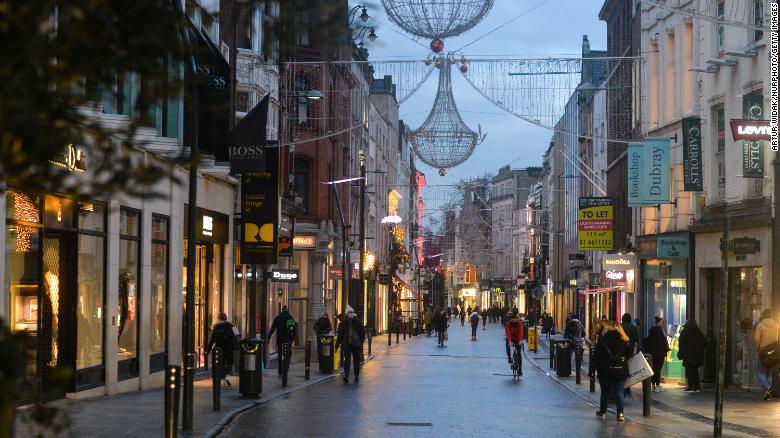WHO calls on Europe to tighten restrictions 1:03
Cork, Ireland (CNN) -
When Ireland emerged from strict six-week lockdown in December, it had one of the lowest levels of COVID-19 cases in Europe.
Since then, the situation has fallen apart dramatically.
The country recorded the highest infection rate in the world last week, according to Our World in Data, an online scientific publication based at the University of Oxford.
PHOTOS |
Europe and the US face a new peak in coronavirus cases
In the seven days leading up to January 10, Ireland reported around 1,323 COVID-19 cases per million people, the statistics showed, more than any other country during the same period.
Alarm in Ireland
On Friday it recorded its largest daily increase in infections since the start of the pandemic, with 8,248 new cases, according to a statement from the Irish health department.
'The alarming level of disease is unprecedented in terms of our experience of covid-19 levels in the community,' warned Professor Philip Nolan, a member of the National Public Health Emergencies Team of Ireland (NPHET).
"We're seeing case numbers per day and numbers in the hospital that we just couldn't have understood before Christmas."
advertising
Irish medical, political and public opinion experts are now debating what went wrong.
The seasonality of the virus, the presence of the UK's most transmissible variant and the mix of households during the holidays contributed to the increase, according to a spokesman for Prime Minister Micheál Martin's office.
The increase is not "simplistic" and there have been a number of factors that have caused it, the spokesperson told CNN on Tuesday.
"We had an increase in socializations over the Christmas period and our public health experts said that the seasonality of the virus was a huge factor," they said.
Ireland reopened hospitality and other sectors with some restrictions on December 4.
Defending that decision, the spokesman said that the sectors involved "in general" adhered to the public health measures and the incidence of infection was "relatively low" in the hospitality, retail and construction environments.
What went wrong?
The UK's most contagious variant, first discovered in Ireland on Christmas Day, "had a very significant impact on the growth of cases because it is believed to be 50% to 70% more transmissible," the spokesperson added. .
About 40% of the most recent positive COVID-19 cases in Ireland are caused by the UK's most contagious variant, Cillian De Gascun, director of the National Virus Reference Laboratory, said in a statement Monday.
As of December 18, Irish households were allowed to mingle with up to two others, despite the fact that other European countries canceled Christmas gatherings.
More than 54,000 people flew to the Republic of Ireland between December 21 and January 3, according to the Department of Justice.
"There was no properly managed isolation system," Gabriel Scally, chairman of epidemiology and public health at the Royal Society of Medicine, told CNN on Tuesday.
'Ireland and Great Britain are failed islands in terms of covid when you look at others.
There was an understandable desire for normalcy during Christmas after a difficult year, but the virus doesn't understand that.
Ireland closed restaurants, food-serving pubs and some shops on Christmas Eve and has since tightened its lockdown measures further, including closing non-essential construction sites, schools and childcare services.
Tension in hospitals
There are currently 1,582 COVID-19 patients hospitalized in Ireland, of which 146 are in intensive care, just shy of the peak of 155 in the spring, according to the health department.
"We know that hospitalizations occur a few weeks after a confirmed case is reported, and mortality after that," Ireland's chief medical officer Tony Holohan said in a statement Monday.
"That means that, sadly, we are heading into a period where the situation in our hospitals will get worse before it gets better."
Ireland has only five intensive care beds per 100,000 inhabitants, well below the OECD average22 of 12, according to OECD data.
So far, the country has reported a total of more than 152,000 COVID-19 cases and 2,352 deaths, according to a tally by Johns Hopkins University.
As for the recent rebound, the tools to address "this accelerated growth rate" are in the hands of Ireland, according to Nolan, who chairs NPHET's Irish Epidemiological Modeling Advisory Group.
He added that he hoped that current measures "would significantly suppress the transmission of the virus."
Kara Fox, Ivana Kottasová, Niamh Kennedy, and Blathnaid Healy contributed to this report.
Ireland

